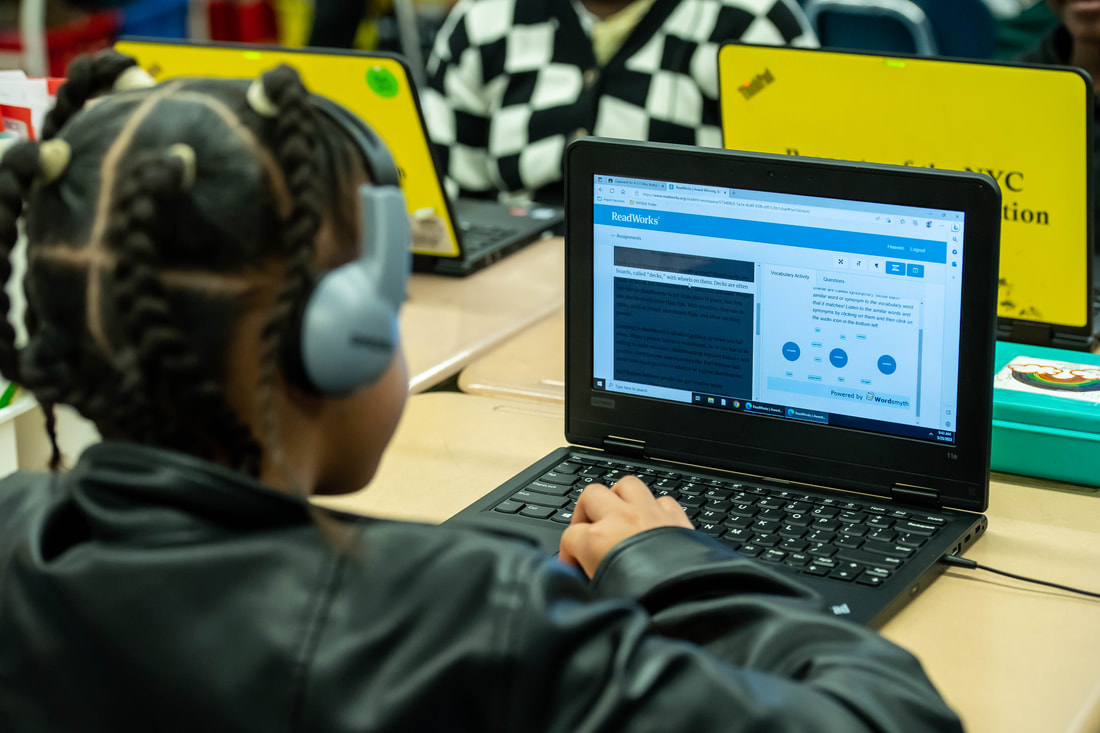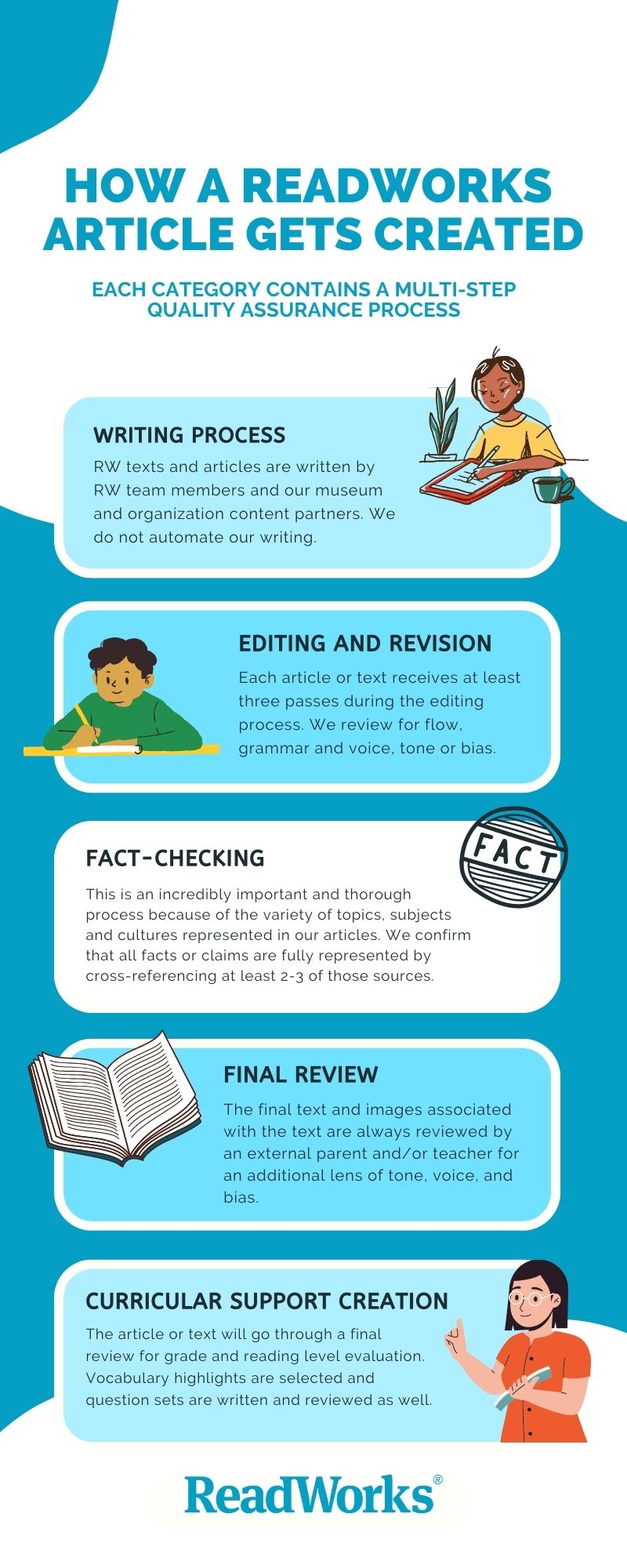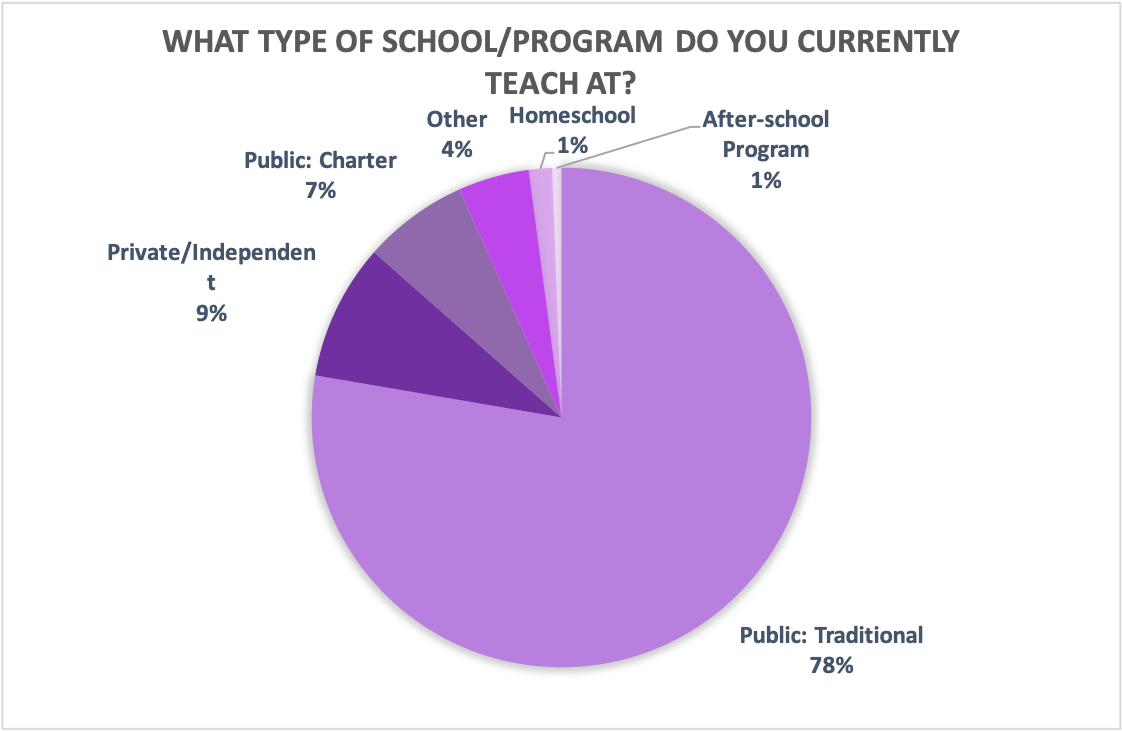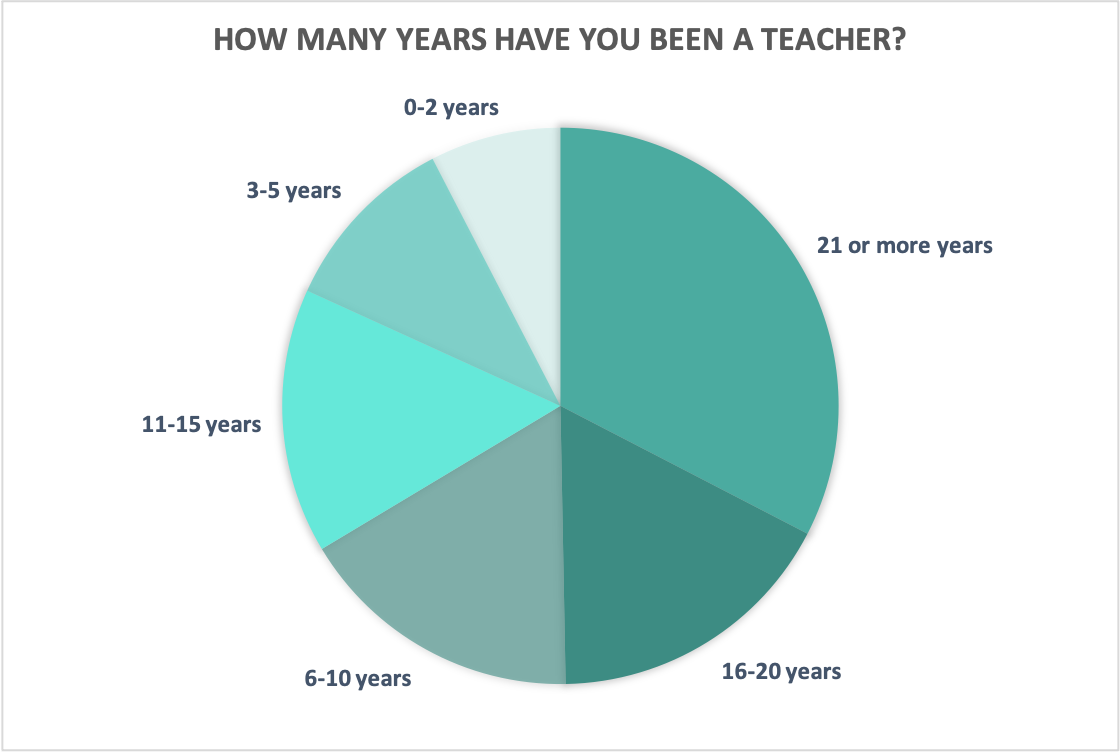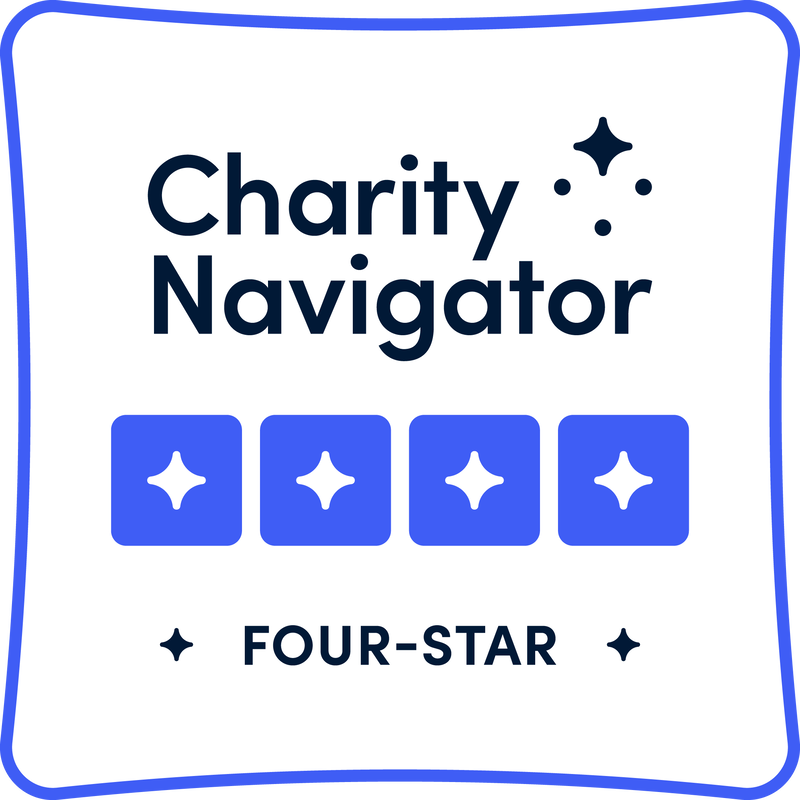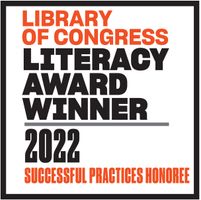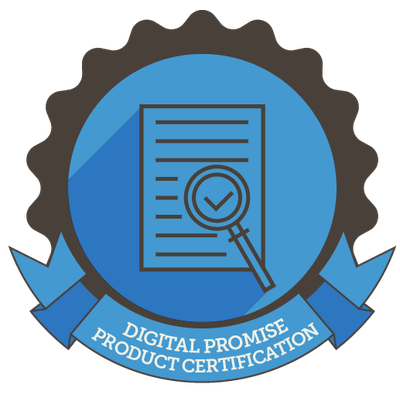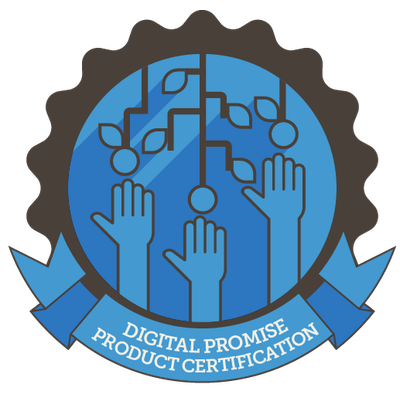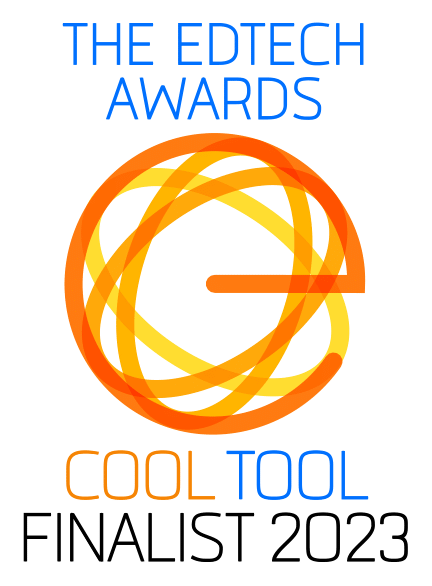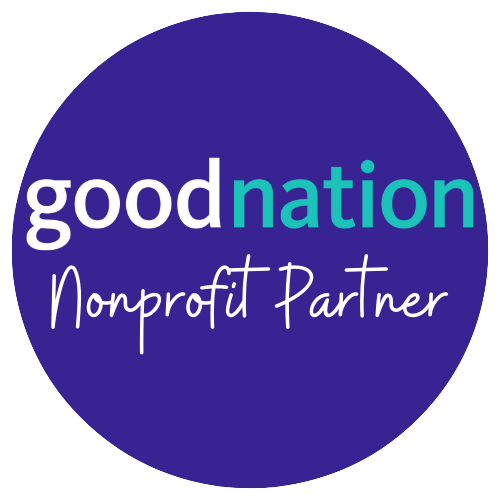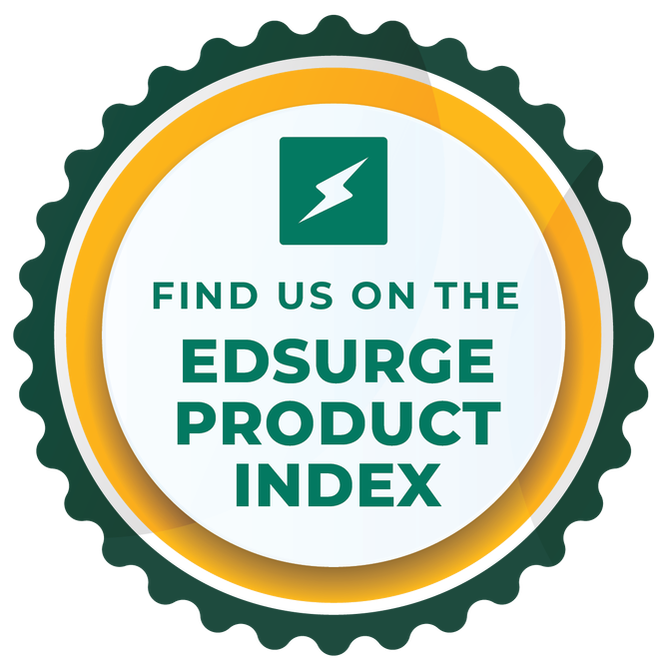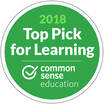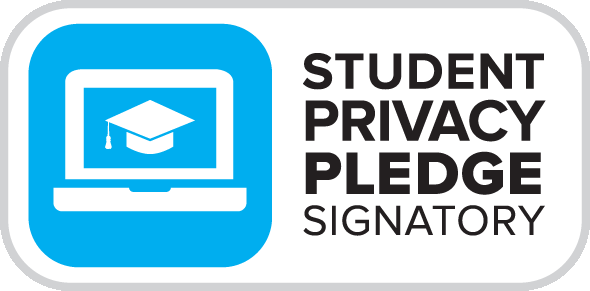|
As teachers face the critical challenge of helping students become successful, joyful readers, they need resources that they know will work. However, “there is a stunning lack of research and evidence to support the efficacy of” the 11K+ edtech tools available (source). ReadWorks is different. Research is at our core. Our ever-evolving, 100% free products are built on the scientific study of reading to ensure students can steadily improve and expand their background knowledge and vocabularies in support of their reading comprehension—helping them become the confident readers they deserve to be. We are honored to have earned Digital Promise's Research-Based Design and Learner Variability product certifications for our careful, research-driven product development on behalf of the millions of students and teachers who use our site each year. Once our resources are launched, we continuously study their impact in multidimensional research studies, led by our internal research team and in partnership with top reading researchers. Because of our robust research agenda, ReadWorks is one of only 26 of the 100 most-used edtech tools in classrooms that meet Every Student Succeeds Act (ESSA) requirements, according to a report from LearnPlatform by Instructure. ReadWorks currently meets ESSA Tier 3 evidence requirements. In a 2022 study, researchers at NYU Stern School of Business found that students who complete ReadWorks multiple-choice questions progress over time, implying that students’ reading performance benefits from regularly doing ReadWorks question sets. This study also corroborated two earlier Digital Promise studies (in 2020 and 2019) by finding that differentiation within ReadWorks digital assignments helps students confidently and successfully tackle challenging reading. The impact of differentiation on student assignment open rate was even larger for the high-poverty group than that for the low-poverty group, implying the potential benefits of differentiation, especially for more disadvantaged groups. In 2023, we launched a multi-year research plan that will deepen our investigation of ReadWorks’ impact on teacher practice and student outcomes, while continuing our mission of advancing the broader field of reading comprehension research through our innovative work. To continue examining the effectiveness of our high-quality passages designed to improve students’ background knowledge and vocabulary, our research team is studying our flagship product, Article-A-Day. A 2023 spring pilot with over 150 students in eight North Carolina classrooms found promising evidence that Article-A-Day can augment background knowledge and vocabulary. Our research team will conduct a follow-up study this year and will also use the pilot data to refine our new background knowledge assessments. We will share our assessment work with the broader field to help advance research in this critical aspect of reading comprehension, as background knowledge, a key part of reading success, can be challenging to measure accurately and reliably. We could not deepen our research efforts without the support of our school and district partners. Thank you to the teachers and students who support research in the classroom. You can find additional case-studies that have proven impact and have influenced our design decisions. Contact [email protected] if you are interested in partnering or learning more about a research study. Written by:
Susanne Nobles, Ph.D., Chief Academic Officer
1 Comment
ReadWorks is excited to add even more free curricular support for early readers! It is vital to give readers the opportunity to build background knowledge while practicing the letter-sound code that brings reading to life. Enter the new decodables on ReadWorks – a series of short, nonfiction texts designed to enhance curriculum and teacher instruction for early readers. Developed with expert writers and early reading thought leaders, these new decodables enable teachers to harness even more of the high-quality tools and sequences that ReadWorks offers. “The team at ReadWorks is dedicated to the mission of offering free reading comprehension tools for teachers, and it was essential for us to develop specific tools for early readers. The popularity of the fiction decodables aligned to ReadWorks nonfiction articles that we offer in partnership with Whole Phonics provided us a launching pad into writing nonfiction decodables that work in step with our Article-A-Day scope and sequence. Early literacy is the cornerstone of educational success, and we are excited about the positive impact that these new decodables can have on children's reading development," Susanne Nobles, Chief Academic Officer, ReadWorks Here are the powerful features and benefits of the new ReadWorks decodables and how they can be used to revolutionize early literacy education.
2. The Power of Nonfiction for Early Readers Often, knowledge and vocabulary development are sacrificed for early readers because the texts they are reading are solely focused on word recognition. Teachers can deliberately support their students’ knowledge-building by pairing ReadWorks content-rich, listening-level passages with ReadWorks free decodables on the same topic. "We’ve all heard the adage that children first learn to read, and then they read to learn. Yet decades of research show that this is a false dichotomy ... From the very beginning, children can build knowledge of the natural and social world through read-alouds ... [and] build knowledge through texts that they are learning to read themselves" (The Scientific Advisory Committee, Knowledge Matters Campaign). Source 3. Cultivating Reading Comprehension Proficiency These new decodables are particularly unique because they give beginning readers the opportunity to build background knowledge while practicing mastering the code. ReadWorks created decodables that work with our Article-A-Day scope and sequence to help students build language comprehension while they also become proficient with word-level reading. ReadWorks has been honored to have expertise on this project from Dr. Julia Lindsey, creator and author of Beyond Decodables, author of the book Reading Above the Fray, and former elementary teacher turned early literacy consultant. She says, “I’m thrilled for educators to use the new high-quality decodable texts available for free from ReadWorks. ReadWorks’ decodables are nonfiction, informational texts created via the same rigorous vetting process as their other resources. By combining decodability and content (linked to Article-a-Day), these texts have the potential to simultaneously support children’s foundational skills and knowledge development — an all-around win!” ReadWorks continues to pave the way for accessible, engaging, and transformative free resources that improve reading comprehension to reach every grade level, school, and district. Decodables for first grade and kindergarten are available now, and second grade texts are being written. Teachers can find decodables within our Article-A-Day Scope & Sequence on ReadWorks. Be sure to register for our upcoming webinar Fostering Joy in Early Readers, How to Use New decodables on ReadWorks on August 15th. Written by:
Melissa Calder, Director of Marketing and Engagement Susanne Nobles, Chief Academic Officer “What’s your best digital reading format?” Do you prefer Arial font with 15 point size and wide character spacing, or Helvetica font with 20 point size and traditional spacing?” Have you ever even thought about which digital format works best for you while reading on a device? Maybe you already adjust your screen away from the default text or you have used the pinch and zoom feature to adjust text size. The ability to quickly and easily change your font size and spacing can result in instantaneous improvement in reading speed and comprehension. Many of these adjustable features and tools are not yet available for young students. ReadWorks is leading the charge to provide access to digital format options for K-12 students on all of our high-quality passages. Tailoring education to individual needs is not new– some students need glasses and some need to sit closer to the front of the room in order to learn and perform better. Differentiating to meet students’ needs looks different, however, in the age of digital learning, finding solutions is a deep focus at ReadWorks. “We feel privileged to be part of the research team investigating how the visual features of typography affect reading fluency and comprehension by having a variety of digital formats implemented on the ReadWorks platform. Much of this work has already been implemented for college and adult students, and now we are able to be leaders for K-12 students,” said ReadWorks Chief Academic Officer, Susanne Nobles, Ph.D. So, how do we know that reading format can help students with reading comprehension? In a first-of-its-kind research study conducted by ReadWorks, Chapman University, The Royal Danish Academy, and Readability Matters, students showed an average increase of 20% in comprehension based on a change to the reading format, which can translate to an increase in up to two letter-grades for students. And for those most impacted by text format, the percentages gained were even higher. Source We are continuing to dig into these exciting early findings. As part of a research study with the University of Oregon, Readability Matters and the iDEAL Institute at Loyola Marymount University, students on ReadWorks will use a new assessment tool to determine their best reading format. Student’s best-performing reading format will be provided to them while on ReadWorks without any additional burden for teachers to manage. The outcomes of this research can significantly inform Universal Design for Learning (UDL) guidelines and best practices for how edtech organizations create and deliver tech-enabled resources and tools. With a vast educator base, ReadWorks is in a uniquely advantageous position to quickly roll-out new features to support millions of students and help lift the barrier to high-quality, research-based tools and resources that improve reading comprehension. Digital text formats are an important new avenue to continue to differentiate and personalize learning needs. Rather than using tools that work better for many students, we can implement tools that work best for each student. Written by:
Melissa Calder, Director of Marketing and Engagement Susanne Nobles, Ph.D., Chief Academic Officer “ReadWorks provides high-quality and diverse texts in a similar format to our online state assessment. This practice in reading, comprehension, and test-taking strategies is an invaluable resource for all of my students.” - Sarah, Teacher, Arizona “I love the ability to find high-quality reading materials that can be printed or accessed online. It is a great service.” - Jacki, Teacher, Vermont
Once an article is ready for prime time, we create the curricular supports you know and love - including our research-based question sets, vocabulary activities, and human-voice audio - each of which undergoes its own process of quality review and approval. The process of ensuring a high-quality text doesn't just end at publication, but it's ongoing and dynamic. The texts go through yearly reviews to keep our content up to date. Reading research shows that building background knowledge helps students become better readers. We also know that there’s no substitute for reading texts from expert and diverse voices. For these reasons, we work with learning and content partners to bring articles spanning a wide range of topics from subject matter experts and diverse authors to teachers and students. In our library, you will find articles written by conservation experts from the National Fish and Wildlife Foundation, science educators from the American Museum of Natural History in New York, historians and history educators from the New-York Historical Society, art educators from the Philadelphia Museum of Art, International Quilt Museum, and the Museum of Modern Art. We also have many authors from a variety of culturally diverse backgrounds who write fiction texts based on their lived experiences. Our trusted, high-quality, culturally diverse, and relevant library makes an impact across all communities, socioeconomic levels, and cultures. We are thrilled to be making differentiated instruction and personalized learning feasible for teachers to create a joyful and successful reading experience for every student. Written by:
Manjula Raman, Senior Director of Content & Curriculum / Senior DEI Coordinator Melissa Calder, Director of Marketing & Engagement Nathalie Karimian, Ed.D., Content & Curricular Supports Developer Susanne Nobles, Ph.D., Chief Academic Officer ReadWorks is an edtech nonprofit focused on improving reading comprehension. We have a deep-seated belief that ALL students deserve a high-quality reading education, one that is based on research, to give them the best possible chance at success in school and in life. Through our digital platform, we provide research-based content and curricular supports that integrate with core English Language Arts (ELA) curricula. By providing reading content that reflects the diversity of our world—and that is freely accessible to all—we work to ensure that every student can see themselves reflected in their reading materials. By providing free materials to make all educators more effective at teaching reading regardless of zip code, we are doing our part to move closer to a world of successful readers with bright futures ahead. Within the complexity of all that it takes to become a successful reader, Readworks' focus area is building students’ background knowledge and vocabulary. Research studies have shown time and again that, whether students are considered “strong” or “weak” readers when prior knowledge is equal, their reading comprehension is essentially the same (Recht & Leslie, 1988). By reading across a variety of topics, students gain a wide base of knowledge and vocabulary that they can draw upon as they encounter new texts. When students encounter this new knowledge, it easily sticks to existing knowledge. ReadWorks Article-A-Day is designed to help students build this critical background knowledge and vocabulary in just 10 minutes a day. Students choose an article to read each day from hand-curated text sets that focus on a new topic each week. They then watch their knowledge and vocabulary grow as they write about what they learn in their Books of Knowledge. With Article-A-Day, teachers can assign the same text for all students to read each day or allow students to choose an article each day from those in the set. This allows for both flexibility and intentional choice for educators and students. In two prior studies, we found that consistent implementation of Article-A-Day led to an increase in the length of students’ written Book of Knowledge responses and their use of Tier 2 and Tier 3 vocabulary (2020) and a 15% correlational increase in ELA test scores (2017). In these exploratory case studies, we sought to build on these findings by examining the impact on both individual students and the school community of classroom and whole-school implementation of Article-A-Day. Here are our major findings and links to each full case study:
Written by:
Serena Bradshaw, Research Specialist A sixth-grade Navajo educator, Mr. Leon Haskie, implemented Article-A-Day in his classroom for eight months, from September 2021 to May 2022. At Haskie’s school, Atsá Biyáázh Community School in New Mexico, over 90% of the students are connected to the Navajo tribe, and the other students are mixed with Navajo and another tribe. The school-wide ELA program is Journeys. The school also has monthly testing to measure student trends of success in each standard across reading, science, and math. In light of the impact of COVID-19 on student learning and the school’s shift to remote learning, Haskie started implementing Readworks, and more specifically Article-A-Day, as a digital supplement. He had the following goals for using Article-A-Day:
Haskie implemented Article-A-Day as a 10-minute bell ringer five days a week at the onset of class. Students picked an article of their choosing from the week’s Article-A-Day set. Once students had read their articles for that day and written in their Books of Knowledge, Haskie would call on random students to present what they learned from the Books of Knowledge. On some days, he also had students peer review other student's work, which took three to 10 additional minutes. Haskie found that this peer work led to greater student engagement. Haskie graded Article-A-Day as 20 points per article for a total of 100 points per week. For any additional articles students read outside of the required bell ringer, he gave them five extra points. We conducted a 30-minute interview with Haskie on July 27th, 2022. In this interview, we hoped to investigate two questions about Article-A-Day implementation:
After the interview, we transcribed and coded the transcript for themes to help us dig into our questions about the impact of Article-A-Day. Findings Haskie’s implementation of Article-A-Day produced many clear benefits. First, he found that student engagement increased in the virtual classroom setting. Second, he found that students’ reading and writing production both increased. Third, he also found that students improved on their monthly standardized testing by large percentages. Finally, through all of his success with Article-A-Day, his school asked him to lead a training to support implementing Article-A-Day schoolwide. 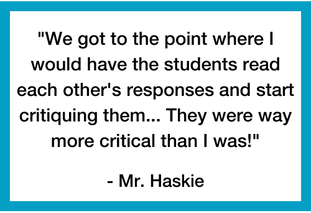 Finding #1: Increased Student Engagement Haskie implemented Article A-Day as a nonnegotiable in his classroom, which ensured that all students fully participated even with the challenge of virtual learning. After completion of Article-A-Day each day, he checked their work for the grade, and then the students began to join in on the review. He said, “We got to the point where I would have the students read each other's responses and start critiquing them. The students would say, ‘That's not a complete sentence’ etc. They were way more critical than I was!” This peer review engaged the students tremendously, so Haskie sought to implement new strategies to maintain this engagement but lessen the extra time it took: “I did not do every single student during a peer review. I had this program where I could select a random student. The students didn't know who was going to be drawn, so they were all responsible because they didn't want to be that child who didn't write down anything.” As this process continued, instead of feeling anxious about being called next, the students began volunteering themselves. This surprised Haskie: “At first, they were like, ‘Oh, I hope I don't get drawn.’ But as we started progressing throughout the year, I started to see that they would actually volunteer their work to be showcased.” This excitement about Article-A-Day, peer review, and being called on was evidence to Haskie of his students’ increased engagement. 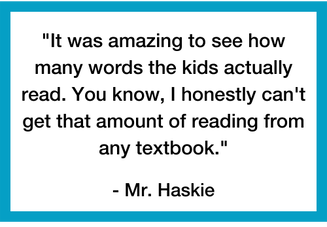 Finding #2: Increased Reading and Writing Adding on to the student's willingness to engage, Haskie also observed a noticeable increase in the amount students read and wrote. Haskie and the students could see, through Readworks’ word tracker report, how much more reading was happening. Both Haskie and his students were surprised at the amount that they were reading. Haskie said, “At first, the tracker read 100,000 words and then 150,000 words – you know, they were just surprised. It was amazing to see how many words the kids actually read. You know, I honestly can't get that amount of reading from any textbook.” Even the administration at Haskie’s school took notice of the increase in reading and asked Haskie how he got students to read so many words. When he explained that Article-A-Day had been used as a bell ringer and a supplement to their Journeys program, the school asked him to train other teachers on Article-A-Day so that the school, starting September 2022, could begin a school-wide adoption of Article-A-Day. Beyond the increase in the quantity of reading, Haskie also observed an increase in writing. He challenged his students to write throughout the year. He described his method as, “I started out with plain and simple. I was happy when they answered, that's all I cared about. That went on for like a good month. Then I increased it to wanting to see complete sentences. I kept that going for like 3 or 4 months. Then I increased the rigor. I expected them to cite from the article they read that day.” As he kept this up, the students began to write at more and at more complex levels. The teacher explicitly noted that, though his goal was to increase reading and engagement, he “saw the students’ growth in writing just from reading.” He attributed this to the simultaneous act of reading and writing about their experiences from the text. 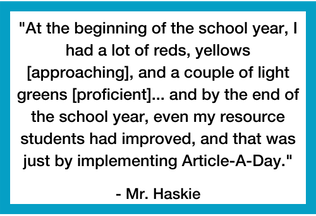 Finding #3: Improved Standardized Test Scores Haskie also observed improvement in students’ standardized test scores. Haskie did not shy away from explaining what he felt contributed to the improvement in scores for the students: “At the beginning of the school year, I had a lot of reds, yellows [Approaching], and a couple of light greens [proficient]. Dark green would be a highly proficient student. Then we progress-monitored, and by the end of the school year, even my resource students had improved, and that was just by implementing Article-A-Day.” According to Haskie, regular implementation of Article-A-Day was a key part of his students’ improved standardized test scores. Conclusion In this exploratory case study, we set out to understand the impact of one teacher using Article-A-Day regularly over an extended period of time, and we saw clear successes and benefits. Through Article-A-Day, students were more engaged which led to an increase in reading and writing on a personal level. On a systemic level, the administration saw improvements in this specific teacher's standardized test scores due at least in part to the implementation of Article-A-Day and are now implementing Article-A-Day school-wide. This shows that the implementation of Article-A-Day by an individual teacher can positively impact students’ academic and personal growth, help shift classroom culture, and ultimately inspire an all-school implementation. Written by:
Serena Bradshaw, Research Specialist Susanne Nobles, Ph.D., Chief Academic Officer An elementary private school in Trinidad and Tobago implemented Article-A-Day school-wide for 10 months, from September 2021 to June 2022. The school administration framed Article-A-Day as a library challenge that students could opt into and earn “house” points, much like reward points in the U.S. In light of the impact of COVID-19 on student learning and the school’s shift to remote learning, the administrators’ goals for using Article-A-Day as a digital supplement were to:
The library challenge started at the beginning of the school year (September 2021) and had run for 16 weeks when we conducted two focus group interviews at the end of January 2022. One interview was with the librarian overseeing the challenge and the school principal, and the other was with five students who participated in the challenge and were in grades equivalent to the U.S’s second to fifth. We hoped to investigate through these interviews three questions about all-school Article-A-Day implementation:
Findings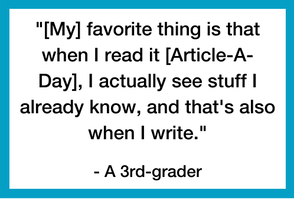 All-school implementation of Article-A-Day produced many clear benefits. First, Article-A-Day allowed students to read texts that they were interested in, while also practicing the reading skills that the administrators knew were necessary for the student’s reading success. Article-A-Day also helped students maintain regular reading because ReadWorks was available as an online tool, which allowed students to read more on their own time and pacing. Lastly, students gained valuable background knowledge, grew their vocabulary, and increased their writing. All of this was seen by their teachers and parents. Finding #1: Culture of Learning A culture of learning is an environment in which students seek to gain knowledge and are eager to learn. Students’ reflections in our interview showed that they had participated in a culture of learning through doing Article-A-Day. One student shared, “I enjoy reading Article-A-Day very much because I get to learn new things.” Another student commented, “[My] favorite thing is that when I read it, I actually see stuff I already know, and that's also when I write.” Students also really enjoyed learning about new topics: “I also learn a lot from those stories, like about events and sometimes about animals too.” This allowed them to engage with the adults in their lives about their newly learned subjects. The students shared that even their parents got involved with their Article-A Day activities. This culture of learning also sparked curiosity on the students’ behalf. The librarian and principal noted that the students read about someone from Trinidad and Tobago and wanted to know more about their island’s historical origins. This culture of learning and curiosity then led to the exploration of new information about their homeland. At the end of the interview, the administrators also asked on behalf of their students for more culturally relevant texts to help quench this curiosity. Through the implementation of Article-A-Day, students clearly learned a great deal and were excited to share this learning and to learn even more. The adults also found that Article-A-Day contributed to a culture of learning. Instead of just reading a passage and answering questions, the students were more willing to discuss what they had learned and apply it to other areas outside of Article-A-Day. The librarian stated, “I think that the kids produced and talked more with the [Book of Knowledge] entries, and I find that they are engaging with the material.” She also shared, “They always come back saying, ‘Ms, I read this, and I read that, and I can't believe this. I can't believe that!’ Even the parents themselves are remarking that they are learning stuff from [Article-A-Day], like they didn't even have a clue what was in the article before! So it's teaching everybody all around.” This shows that the culture of learning built by Article-A-Day is inclusive, supporting all parties involved. 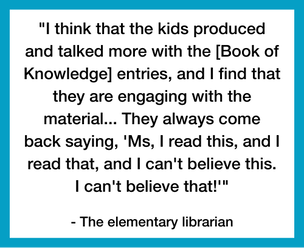 Finding #2: A Culture of Background Knowledge A culture of growing background knowledge is one that allows students to deeply engage with and make connections among what they are reading. Students’ reflections in our interview showed that they had participated in a culture of growing their background knowledge through doing Article-A-Day. A student shared, “It gives me more knowledge to learn more about and to be more interested in those types of things and to ask more questions about the different things in school.” Students developed deep knowledge about the topics from Article-A-Day as they engaged with each topic for a full week. A student even specifically recalled the first woman to study insects, which she learned from one of her Article-A-Day sets. The librarian and principal were excited to see how much Article-A-Day expanded their students' understanding of the world and of new vocabulary, and this showed through students' newfound interest and engagement.  Finding #3: Student Engagement While the students in the study were in part extrinsically motivated by the house points, students were also excited about taking 10 to 15 minutes each day for Article-A-Day. Students shared this excitement with us as they talked about being asked to write two or three things that they learned in their Books of Knowledge and wanting to write more. “And when they say to write two or three things you remember, I don't like to go to just three things. I just wrote a summary of the whole story.” Students also expressed their excitement for doing Article-A-Day even on the weekends. One student stated, “I can see myself jump out of bed and run to my laptop to do ReadWorks.” While many students were initially motivated by the house points, the adults were pleasantly surprised by the broader engagement in reading and writing across grade levels. “At the beginning, what I was really surprised about is that nobody had to be the Big Bad Wolf and ask students, ‘Did you do your homework?’ They're so eager to do it!” This excitement caught the administration by surprise because, in previous experiences with other assignments, they had had to continuously remind their students to do the work. The principal said, “They are engaging with the material and things that they learned. You know it doesn't seem to me to be just parroting or just cutting and pasting something.” Through this all-school Article-A-Day implementation, the principal and librarian saw a clear increase in student engagement. ConclusionIn this exploratory case study, we set out to understand the impact of one school’s all-school Article-A-Day implementation, and we saw clear success and benefits. Through Article-A-Day, students enjoyed reading and learning about new things. This finding is particularly impactful for teachers who are struggling to engage their students; Article-A-Day can help. The students and teachers also found value in having cultural texts that resembled the identities of the students reading them. Overall, students’ reflections showed that they had participated in and enjoyed a culture of learning through doing Article-A-Day at their own pace, and administrators’ reflections showed that the students had built their background knowledge and vocabulary while being motivated by and engaged in the reading. This all-school Article-A-Day implementation was a success for both administrators and students. Written by:
Serena Bradshaw, Research Specialist Susanne Nobles, Ph.D., Chief Academic Officer Wendy Xiao, Director of Teacher Practice At ReadWorks, we are always striving to better serve you, our educators, and, in turn, your students. We conducted our first national educator survey in fall of 2019 to be sure we understand your needs. As the pandemic has changed so much about what you and your students need, we released our second national survey this past fall. We heard back from almost 9,000 of you! By understanding how you are using our free resources, we are committed to helping you improve students’ reading comprehension and accelerate their learning recovery. Keep reading to see what you all taught us! Who did we hear from? We had respondents who teach all grades from preschool/Pre-K to adult learners, with the most popular grades, in order, being 5, 4, 3, and 6. We also had respondents from all 50 states, the District of Columbia, and internationally, with the highest responses from California (9%), international (6%), Florida (5%), and Georgia (5%). This diverse representation allows us to understand how ReadWorks is used for different populations in different parts of the world. How do these educators use ReadWorks? We primarily heard from high-use educators, with 69% of respondents using ReadWorks weekly or twice or more per week. We learned that special education educators are the most likely to report frequent use (93% of SPED teachers use ReadWorks frequently), and educators who teach grades 3, 4, 5, and 9, as well as adult learners, are also more likely to use ReadWorks frequently. Not surprisingly, time (both instructional time and time to explore all ReadWorks offers) is the biggest barrier for not using ReadWorks more frequently. Across all of our offerings and resources, we were eager to learn what educators found most valuable about ReadWorks. The top choice was “reading passages that are engaging,” followed by “text-dependent question sets” and “easy instructional routines to supplement my reading instruction (e.g., Article-A-Day).” With our library of thousands of nonfiction and fiction passages, we were heartened to learn that 84% of educators are able to find texts that are representative of, and therefore more engaging to, their students. We also wanted to dig into how teachers are assigning texts and whether they are assigning grade-level material by the end of the year, knowing the urgency of having students reading on grade level. Interestingly, the majority of educators tend to assign the same grade level of ReadWorks passage at the beginning and end of the school year. 40% of educators start the school year assigning passages at their students’ grade level, and by the end of the school year, 59% of educators are assigning grade-level texts to the majority of their students. This behavior differs for elementary, middle, and high school: as the age of students increases, more educators report assigning passages that are one or more grade levels below. Particularly for high school, 53% of educators begin the year assigning passages that are 2+ grade levels below, and over ⅓ of these educators still assign passages that are 2+ grade levels below at the end of the year. It is clear to us that ReadWorks is often used for intervention for older students. How do these educators meet the needs of all their students? When asked about student populations (with the option to check all that apply), 72% of respondents teach general education, 53% special education, 42% students from low-income households, 39% ELLs, 30% students who have experienced trauma, and 28% students with dyslexia. The overlap of student population choices make it clear to us that the majority of you need to adapt your instruction to meet the different needs of your students, many of whom receive special education services, come from low-income communities, and/or are English learners. We were thrilled to learn that almost 2/3 of respondents use ReadWorks to differentiate for their students. Many educators assign different texts for their students, as well as turn on audio to accompany the texts. Additionally, 1/3 of educators have assigned StepReads, which are a way to scaffold emerging, beginning, or struggling readers by allowing them to read a more accessible version of a passage before tackling the original grade-level text. Unfortunately, respondents confirmed what we feared: that our other differentiation tools, like eBooks, Article-A-Day ELL supports, and offline mode, have low usage and awareness. So, this is one area we are trying to improve upon. What Next? The insights that you all shared have spurred us to action! Here is how we are already incorporating your feedback:
We cannot thank each of you enough and deeply appreciate what you do for students every single day. We hope you find these insights and new features exciting as you continue to engage your students to deepen their knowledge. Written by:
Susanne Nobles, Ph.D., Chief Academic Officer |
Categories
All
Archives
July 2024
|


